 Proof That It’s Pre-Code
Proof That It’s Pre-Code
- It’s about a lady gangster who takes over a mob through her wits rather than with her body– which is pretty rare for a Pre-Code. She’s vicious, cunning, and makes suckers out of her enemies.
- Blondie goes into the hospital to visit her gangster cohort who was run down by an upset mob boss, and gets caught with a gun on her. Now guess where she was packing the heat:
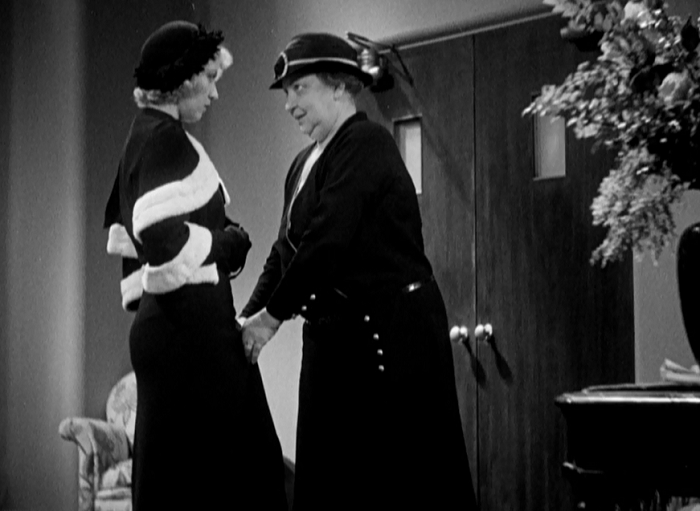
And to be perfectly clear, when I say ‘the heat’ I mean ‘her gun’.
- Blood and murder galore, and a few attempts in between. It’s not often you see blood in these old movies (I don’t think squibs will be invented for a while yet), so it’s cool to see it used effectively in a few scenes here.
The Particulars of the Picture
 |
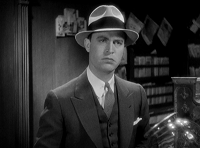 |
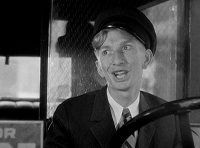 |
| Blondie … Joan Blondell |
Danny Jones … Chester Morris |
Red … Sterling Holloway |
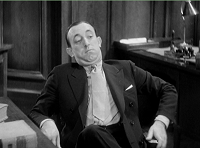 |
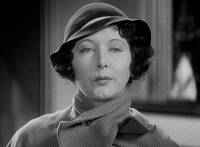 |
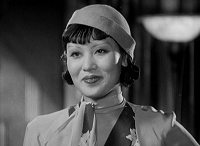 |
| Louis … Allen Jenkins |
Mae … Mae Busch |
Lulu … Toshia Mori |
Blondie Johnson: Guns and Gams
“Those with money have it, those who don’t have it, don’t.”
Getting ahead for women in the Pre-Code Era was often viewed as using logical assets their advantage, and the most logical assets a woman had were her womanly wiles. Barbara Stanwyck displayed this in Baby Face a few weeks ago, where we follow along as she sleeps her way to the top of a bank. Hell, the popular Gold Diggers series is entirely about young women using their beauty to carve out a comfortable living for themselves.
Blondie Johnson bucks this trend in a big way, with mobster Virginia “Blondie” Johnson making her way up the underworld’s ladder with her wits and determination rather than the considerable curves of her elegant gowns. Since she’s played by the wonderful Joan Blondell, she not only has brains, but guts and wry putdowns to spare.
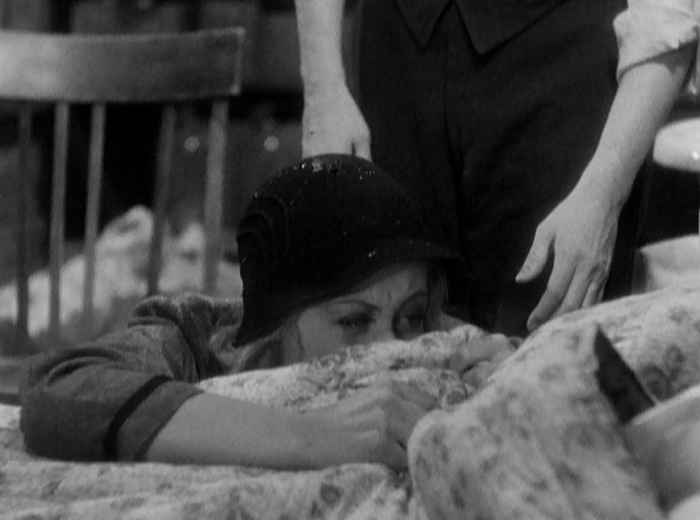
You can tell she’s poor in this screenshot because of that hat.
After being let go from a job for not returning her boss’s amorous advances, she finds herself in an unemployment office, begging for money to help keep her and her mother alive. She’s told she’s not needy enough (with the clerk even insinuating that she should have surrendered to the advances rather than be put out on the street), and soon she’s rejected and returns home to find her mother dead.
This is her origin story, so we flash forward to her funeral to find that a happy, condescending priest is telling Blondie that it’s a tragedy, but we must all work hard for what we earn. Blondie glowers; there’s an easy way to make money, too.
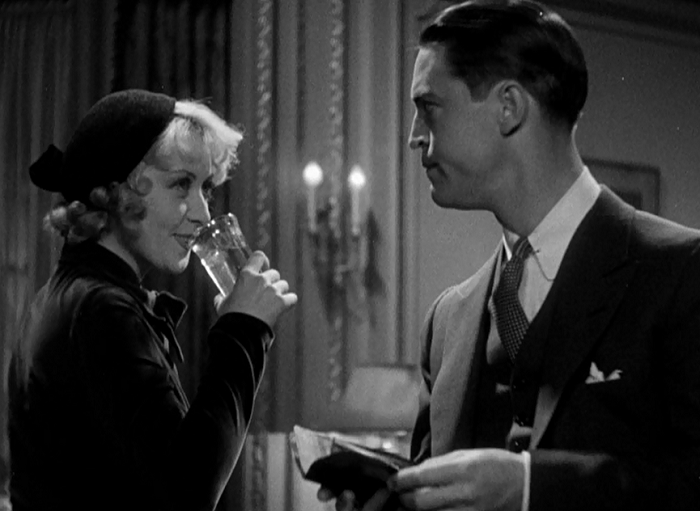
One upping every gangster at their own game, one grand at a time.
“I found out the only thing worthwhile is dough. And I’m going to get it, see?”
This determination to survive in spite of the shit society has heaped upon her sends Blondie to the big city, where she starts with a couple of small scams before falling in with Danny Jones, a guy high up in the mob who plays lapdog to the big man, Max. Blondie sees plenty of lateral movement available to someone like Danny, but the dumb bastard initially can’t see anything in her beyond her beauty.
So Blondie gets to work, first freeing a big dumb mug who was on trial for murder by playing his despondent wife, and then pitching a scheme to target the city’s jewelry stores with new cons that will encourage them to buy Blondie and Danny’s special brand of insurance.
This doesn’t escape the notice of Max, and soon there’s a miniature gang war that Blondie wins handily with cold blooded determination. And a secret bar hidden in a rotating fireplace because, dammit, if you’re going to off someone, do it with some crazy damn style.
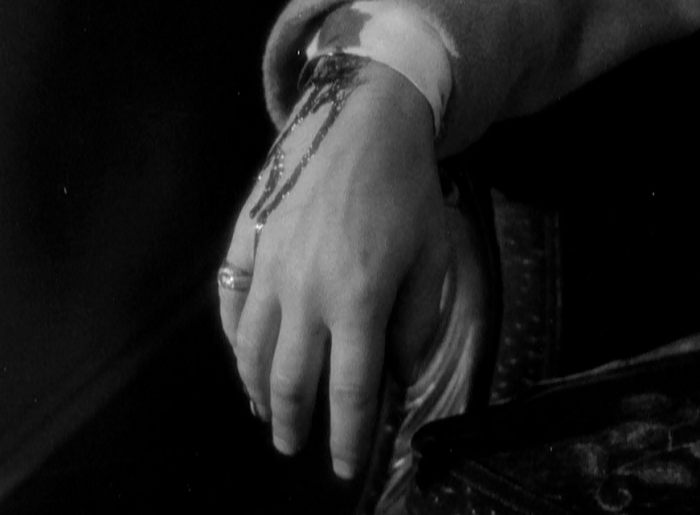
See? “Handily”? SEE?
It’s a very Warner Brothers gangster movie, with more hard boiled slang than you could throw a dictionary at. Blondie tries her best to keep her legs together, bound and determined to make her way to the top. Danny is kind of a dope, though, constantly questioning her and making plays for her bedroom. Blondie has none of it despite admitting that in a different time and place she’d be there, and like a wounded dog Danny runs off in a huff.
Blondie does something interesting here, and that’s have by having the heroine’s two lead female friends question her about the wisdom of this decision. Mae looks her straight on, and asks:
“Blondie… why don’t you give him a tumble?”
The response isn’t as interesting as the question. Blondie doesn’t want to sleep with a man, but others encourage her too. Even if she wants to this time, the audience can’t help but to think back to the beginning of the movie and understand: Blondie giving into temptation is a surrender of her belief in her independence. Blondie Johnson isn’t saying you can’t use your body to get ahead, but if all men see and want is a body, then any success is illusory.
This is put a little more succinctly by Blondie herself:
“For me, business comes before pleasure.”
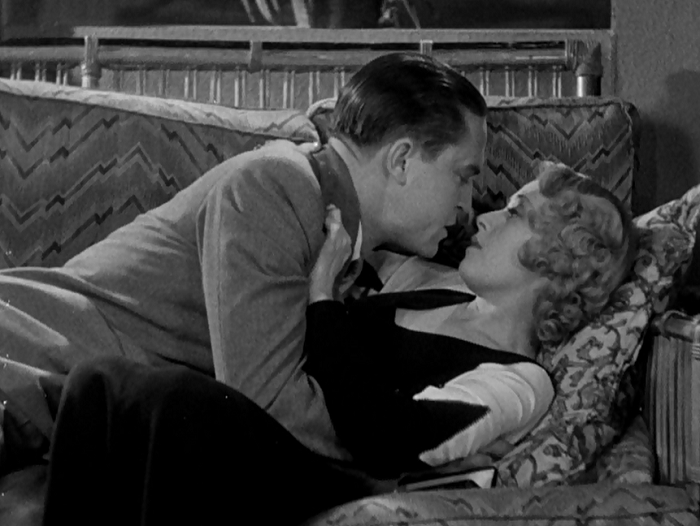
Even if saying ‘yes’ will make you happy, it won’t satisfy you.
But of course, she has to prove not only to her mobsters but to the audience that she means business. We’ve all seen plenty of movies, so we know you don’t put Joan Blondell and Chester Morris in as the stars and not expect them to kiss.
Blondie must make the tough choices here, to prove to herself that she’s a success on her own terms and not just the terms that the male dominated world have made for her. She keeps climbing, even when that means that she has to force Danny out of the organization– he’s simply not wise enough to keep his finances together and his hands off the pretty women who are happy to take his money.
The mob adores Blondie, and make her the boss without a hassle. Blondie is at the top, and though she realizes that she misses Danny, she’s had her dream come true. She took the easy way, and all it cost her was one broken heart.
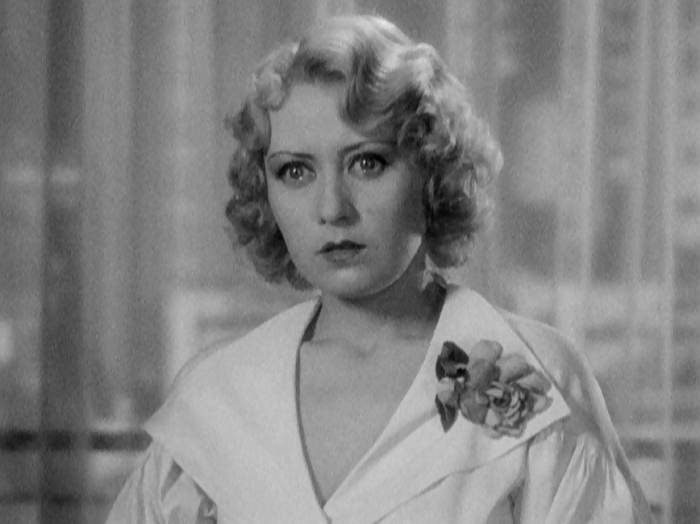
Every emotion in the book comes out in this one.
To this end, she must decide after some damning evidence comes to light whether Danny has turned evidence, and whether or not he should be allowed to live. It’s not many movies that climax with one half a romantic pair having to make the decision as to whether or not the other half should be rubbed out, but I think you’ve figured out by now that Blondie Johnson ain’t your usual picture.
The performances here across the board wonderful. Chester Morris is great as a petulant child who also happens to be romantically enticing– not easy to pull off. Allen Jenkins is the king of cool, and there’s a couple of excellent turns from the whole crew as parts of the film resemble an Ocean’s 11 heist. Director Ray Enright keeps a snappy pace, even if a few shots stick out like a sore thumb.
But the real treat here is Joan Blondell. Warner Brothers worked her to the bone (she was in 38 pictures between 1930 and 1934), and that means she had to suffer her fair share of nondescript and thankless parts. She was someone who usually had to make due with her material, so here, where the material shines, you really get to see Blondell show her skills.
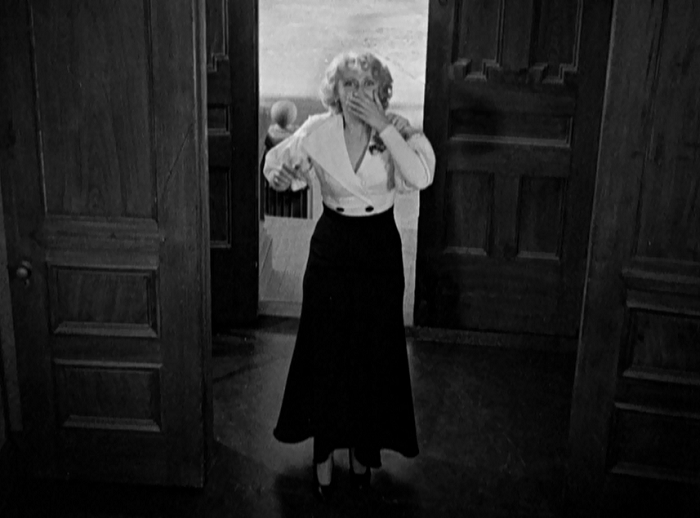
She choose… poorly?
These are all the reasons I liked Blondie, but there were some issues I had with the film. It’s ending, for one, so please skip the next paragraph if you don’t want to be spoiled.
It’s a crime picture, so for the ending we either have the law swooping in or a hail of bullets; I think Blondie doesn’t quite nail this. She finally succumbs to her love for Danny, proving that she can succeed, but this also may put her back into a more subdued role. Both are arrested and Blondie’s gang broken up, and she and Danny pledge eternal love after their prison sentences are up. It doesn’t really work since Danny is doing most of the talking– and we all know the choice Blondie has made. The last scene should have been shortened, or excised altogether.
Regardless, Blondie Johnson is a treat, even if it’s never as rough and tumble as its Cagney and Robinson contemporaries.
Gallery
Here are some extra screenshots I took. Click on any picture to enlarge!
Trivia & Links
- There is one thing I find completely baffling about the film, that I can only imagine was snuck in as some sort of joke. I get where ‘Blondie’ got her nickname. Why is Chester Morris’ character’s nickname “Danny”? As a Danny, I don’t usually meet people who are Dannys who aren’t possibly Dan or Daniels…
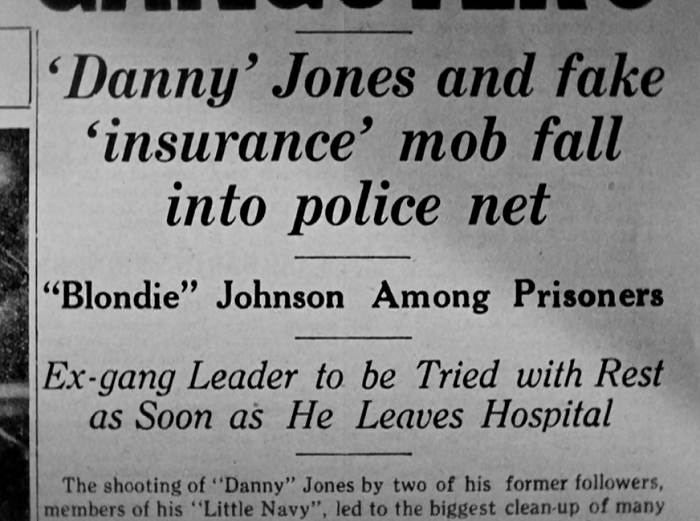
‘Danny’? What?
- I think I’ve mentioned this before, but my favorite contemporary 1930’s reviewer is Andre Senwald for the New York Times, and in his review for the film he makes note (before he spoils the film’s ending):
Of course, the film’s best asset is Miss Blondell herself, who is ingratiating, cynical and tartly amusing.
- In case I didn’t provide you with enough screenshots, DVDBeaver has got a few more as well as some advertising materials.
- TCM delves into a few tidbits in terms of the film’s ‘making of’ information.
- Actress Toshia Mori is a rare Asian face in these usually all-white productions. Her biggest role is in The Bitter Tea of General Yen, which I will hopefully be hitting in the next few months, but if you’re interested in learning more about her, Wikipedia has got some dirt for you.
- Speaking of, this ad is pretty fun:
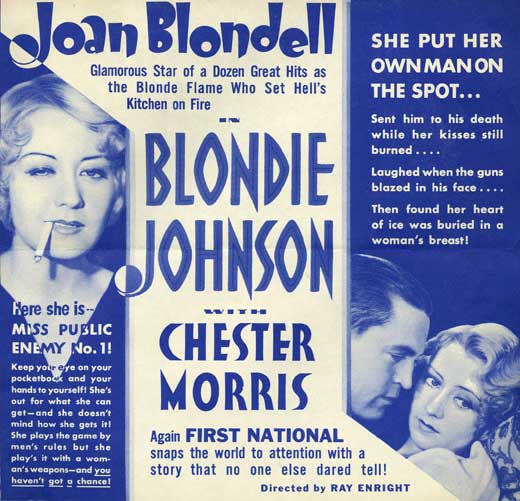
Believe it or not, some of these claims may be exaggerated.
- I also really like the poster for the film, even though something always throws me off when I look at it too long:
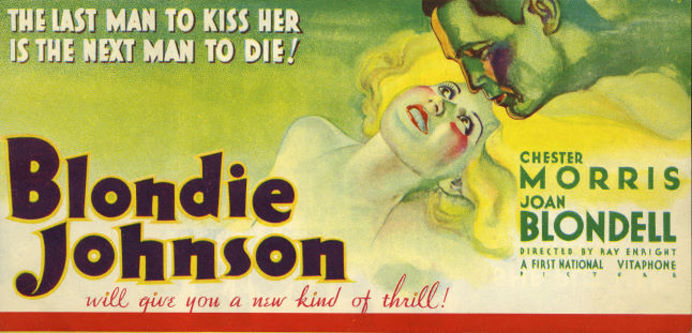
Namely, just how long is Chester Morris’ neck supposed to be?
Availability
- This film is available on Amazon, Amazon Instant Video and Warner Archive, and can be rented from Classicflix.
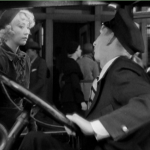
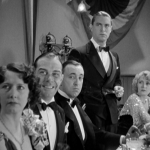
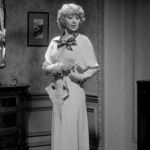
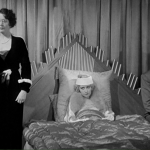
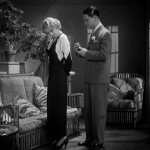
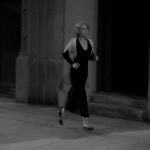
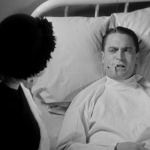
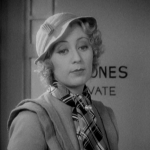
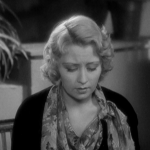
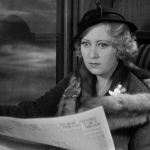
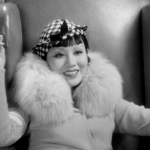
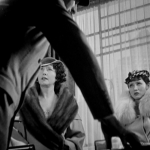




6 Comments
shadowsandsatin · January 6, 2013 at 6:58 pm
Loved your review and I love Blondie Johnson — it’s one of my favorite pre-Codes. Just a great movie, with a great cast.
Danny · January 6, 2013 at 9:17 pm
Thanks Karen. It’s really well done, and a lot of fun!
mykal · January 10, 2013 at 7:02 am
Absolutely fantastic site. I’ll be back.
Danny · January 10, 2013 at 8:57 am
Okay, works for me. Thanks!
Judy · October 21, 2015 at 6:30 am
I’ve just seen this one and really liked it – fantastic part for Blondell. This now has me curious to see more films directed by Ray Enright! This is now available on a French DVD in region 2 – Warner has brought out quite a few Forbidden Hollywood DVDs over there.
Dave · October 18, 2019 at 9:29 pm
When Morris gets engaged to Claire Dodd, the newspaper headline says he’s “R. Burton ‘Danny’ Jones, so it’s anyone’s guess what “Danny” is a nickname for.
Comments are closed.